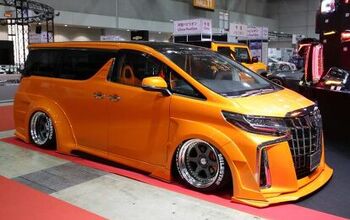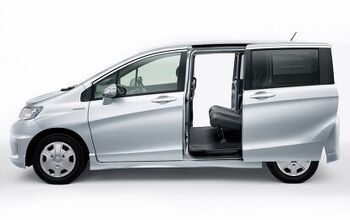And The Bestselling Car In Japan Is ...

The Toyota Prius.
According to Japan’s JADA dealer association data, quoted by the Nikkei [sub], Toyota’s Prius became the first hybrid to take the prime spot on Japan’s annual sales ranking of all cars, including minivehicles. 2009 Sales of the Prius jumped nearly 300 percent to 208,876 units.
Suzuki WagonR minivehicle took second, Daihatsu’s Move minivehicle took the third spot on the podium.
Japan’s second-bestselling hybrid is Honda’s Insight, way down in the #8 slot with 93,283 units sold. Hybrids already make up about 10 per cent of new vehicle sales in Japan.
Despite our best efforts, we can’t get you the complete Japanese Top Ten just yet. Snotty JADA ignores minivehicles in its sales tracking. The 2009 JADA ranking of “real” cars is as follows:
- Prius Toyota 208,876
- Fit Honda 157,324
- Vitz Toyota 117,655
- PASSO Toyota 98,883
- Insight Honda 93,283
- Corolla Toyota 90,178
- Freed Honda 79,525
- Serena Nissan 78,836
- Voxy Toyota 71,426
- Note Nissan 65,745

Bertel Schmitt comes back to journalism after taking a 35 year break in advertising and marketing. He ran and owned advertising agencies in Duesseldorf, Germany, and New York City. Volkswagen A.G. was Bertel's most important corporate account. Schmitt's advertising and marketing career touched many corners of the industry with a special focus on automotive products and services. Since 2004, he lives in Japan and China with his wife <a href="http://www.tomokoandbertel.com"> Tomoko </a>. Bertel Schmitt is a founding board member of the <a href="http://www.offshoresuperseries.com"> Offshore Super Series </a>, an American offshore powerboat racing organization. He is co-owner of the racing team Typhoon.
More by Bertel Schmitt

































Comments
Join the conversation
Wonder why you posted a pic of a 2nd gen Prius when it's the new 3rd gen Prius which has crippled sales of the Honda Insight and done so much to make it #1 car in Nippon? The Japanese Gov't green car incentives (100K yen off, upto 250K yen if trading in a car over 13 years old) have had a lot to do with the purchasability of the Prius and as you mention, Japanese consumers are very switched on to their environmental stewardship.
Bertel, why are the taxi fares so goddamn expensive in Japan?
One car tinier than the next! And minicars aren't even on the list! If they were, even the few microvans at the bottom would likely be knocked off. Even Europeans must seem giant car addicted when viewed from Japan. If the rest of Asia (and the world) follows a similar pattern as it develops, the Detroit/Washington automakers are really going to be in a bind once cars become transportation for the masses, rather than status symbols for the nouveau riches. Anyway, the third gen Prius is one heck of a car. Well built, cheap to operate, reasonably quiet, and with a nice size / roominess tradeoff for urban / suburban dwellers. Much of its success is simply due to it being exactly the kind of car large numbers of people find most appealing, even excepting it's hybridism. The main obstacle to selling this kind of car pre Prius, was simply that rich world motorists were loathe to buy them, as they didn't seem 'cool' enough. Once Toyota broke down that barrier by attaching the Prius to the fad of our age, sales started flooding in. Not because it's buyers are all green zealots, but simply because suddenly the car they always wanted no longer came with such a 'people mover' stigma attached.
Japanes streets are tiny and you need to provide for your own parking unlike the rest of the world. That means that if you only have a tine parking spot (not uncommon) that you can only buy a tiny car. In the rest of the world streets are wider and parking spaces are provided by government (even if you have to pay for it) . Those government issued parking spaces are standardized so there aren't that many people who have to deal with a tiny parking space so less demand for ultra small cars.